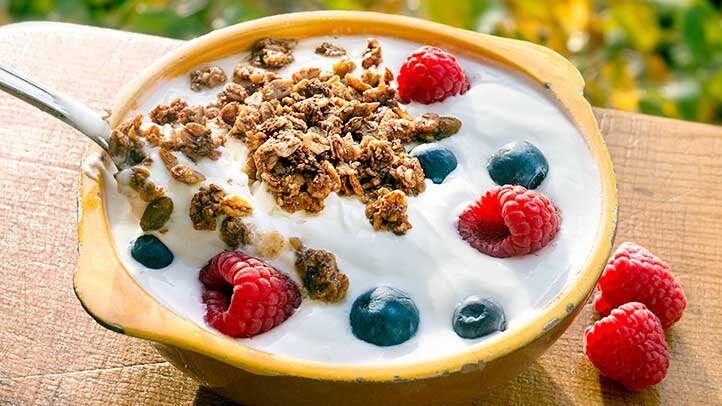
Refined grain can be described as white flour. The endosperm is left intact after the bran and germ have been removed. This is the portion that contains the most nutrients, but is high in carbohydrates. This is why refined grains have become the most commonly used ingredient in baked goods and packaged food. Because they are convenient, they're commonly used as the base for packaged goods.
The American Heart Association recommends that you eat at least five portions of whole grains per day. The American Heart Association recommends that you eat more whole grains than processed grain. A diet high in whole grains has been shown to protect against heart disease development. Some studies are contradictory. The Iowa Women's Health Study, and the Nurses' Health Study both found that whole grains are associated with lower cardiovascular disease risk. According to the American Diabetes Association, 25 million people are affected by Type 2 diabetes. Another 79 million suffer from prediabetes.

These studies have made some findings, but it is important that you don't compare the number of whole grains and the refined grain servings. Seven servings a day of refined grains contribute to nutrient intake without increasing the risk of disease. Refined grains are higher in sugar and fat and should be eaten in moderation. High-quality protein can be found in refined grains. However, don't believe that eating a diet high in refined grains will make you healthier.
Whole grains are healthier than refined grains. There are many benefits to whole grains that far outweigh any disadvantages. These foods are high in cholesterol and saturated fat, so they should be avoided when you're trying lose weight. Refined cereals have higher calories and a higher calorie intake. They also contain less fibre and other nutrients. Refined grains often have a lower nutritional value due to their processing.
Refined grains also contain phytic acid, which binds to nutrients and reduces their absorption. This acid can also prevent the production of healthy fatty acids. Refined grains can lead to an increased risk of cardiovascular disease and obesity. Refined grains are high in phytotic acid, which can be detrimental to your overall health. It can even lead to cancer. Consider the health risks of refined grains and opt for whole grain varieties.

The US Department of Agriculture states that whole grain products have more fiber and less saturated fat. Moreover, studies have shown that whole grain products have a lower glycemic index. Additionally, refined grains have a finer texture as well as a neutral color. It's better to eat whole grain when it comes to preventing obesity and heart disease. If you're worried about what you're eating, you can read more about the benefits of wheat and other grains.
FAQ
How can I get enough vitamins
The majority of your daily needs can be met through diet alone. However, if you are deficient in any particular vitamin, taking supplements can help. A multivitamin supplement can provide all the vitamins you require. You can also get individual vitamins from your local pharmacy.
Talk to your doctor if you have concerns about your nutritional intake. You can find vitamins K and E in dark green leafy vegetable such as spinach, kale and turnip leaves, as well a variety of sweet potatoes and sweet potatoes.
Ask your doctor if you're not sure how many vitamins you should take. Based on your medical history, and your current health status, your doctor will recommend the right dosage.
What are 5 ways to live a healthy lifestyle?
Living a healthy lifestyle involves eating right and exercising regularly. Avoiding sugar and processed foods is key to eating well. Exercise can help you burn calories and strengthen your muscles. You can improve your memory and concentration by getting enough sleep. Stress management can reduce anxiety and depression. Fun keeps us vibrant and young.
What can you do to boost your immune system?
There are trillions upon trillions on cells in the human body. These cells combine to form organs or tissues that serve specific functions. A cell that dies will be replaced by another. Hormones, which are chemical signals that allow cells to communicate with one another, enable them to do so. All bodily processes are controlled by hormones, including metabolism and immunity.
Hormones refer to chemicals produced throughout the body by glands. They travel through our bloodstream and act as messengers, controlling how our bodies function. Some hormones are produced within the body while others are externally manufactured.
Hormone production begins when a hormone-producing gland releases its contents into the bloodstream. Once hormones are released, they move through the body to reach their target organ. In some cases hormones can remain active for only a few hours. Some hormones remain active for longer periods of time and can continue to have an impact on the body's function long after they are gone.
Some hormones can be produced in large amounts. Some hormones are produced in large quantities.
Some hormones are produced at certain times during life. For instance, estrogen is produced during puberty, pregnancy, menopause, and old age. Women can get estrogen to build breasts, prevent osteoporosis, and keep their bones healthy. It helps to stimulate hair growth and maintains skin's softness.
What's the problem with BMI?
BMI stands to Body Mass Index. It is a measurement of body weight based on height. BMI is calculated using the following formula:
Divide the weight in kilograms by the height in meters squared.
The result is expressed using a number from 0 through 25. Scores between 0 and 25 indicate obesity. A score of 18.5 indicates overweight. A score of 23 indicates obesity.
A person of 100 kg with a height of 1.75m will have 22 BMI.
Statistics
- According to the Physical Activity Guidelines for Americans, we should strive for at least 150 minutes of moderate intensity activity each week (54Trusted Source Smoking, harmful use of drugs, and alcohol abuse can all seriously negatively affect your health. (healthline.com)
- WHO recommends consuming less than 5% of total energy intake for additional health benefits. (who.int)
- nutrients.[17]X Research sourceWhole grains to try include: 100% whole wheat pasta and bread, brown rice, whole grain oats, farro, millet, quinoa, and barley. (wikihow.com)
- According to the 2020 Dietary Guidelines for Americans, a balanced diet high in fruits and vegetables, lean protein, low-fat dairy and whole grains is needed for optimal energy. (mayoclinichealthsystem.org)
External Links
How To
Here are 10 tips to live a healthy lifestyle
How to maintain a healthy lifestyle
We live in an era where it is difficult to get enough rest, we eat too often, drink too much alcohol, and use cigarettes. We don’t take proper care of our bodies.
When you work full time and have to balance your exercise and diet, it can be very difficult to create a healthy lifestyle. It becomes even harder if you are stressed out because your mind tells us that we cannot handle this situation anymore so we start feeling guilty and give up.
You may feel that something is not right with your body. You should see a doctor and ask him/her what he/she thinks about your current condition. If there are no signs of something abnormal, stress from your job could be the cause.
Some people think they're lucky because their jobs let them go to the gym on a regular basis or they have friends who help them stay fit. However, those people are really lucky. They don't have problems. They had everything under control. I wish all people could do the same. Unfortunately, most of us don't know how to balance our work life and personal life. Many people have bad habits that lead to illnesses such as heart disease and diabetes.
Here are some tips that might help you to improve your lifestyle:
-
Get adequate sleep - 7 hours a day minimum, 8 hours maximum. This includes good sleeping habits and avoiding caffeine for the last hour before bed. Caffeine blocks the production of melatonin hormones and makes it harder to fall asleep. Make sure your bedroom is dark and clean. Blackout curtains are a must, especially if you work late at nights.
-
Take a balanced breakfast. Avoid sugary products, fried food and white breads. For lunch, try to include fruits, vegetables and whole grains. A good snack option for afternoon is to include protein-rich snacks like nuts, seeds, beans and dairy products. Avoid unhealthy snacks like chips, candies, cookies, cakes and sodas.
-
Get enough water. Many people don't get enough. Water helps us burn more calories and maintains our skin's youthfulness. It also flushes toxins out of our bodies and improves our digestion. Six glasses of water per day will help you lose weight quicker. You can determine how hydrated you are by examining the color of your urine. Dehydrated means yellow; slightly dehydrated means orange; normal means pink; overhydrated means red; clear means highly-overhydrated.
-
Regular exercise can increase energy and decrease depression. Walking is a simple exercise that can improve your mood. Although walking may seem simple, it is not easy. It requires concentration and effort. Walking requires your brain to be focused on the task at hand, and you need to breathe slowly and deeply. A 30-minute walk for 100 to 150 calories can be burned in 30 minutes. Start slowly and increase your pace gradually. To prevent injury, don't forget to stretch after you exercise.
-
Be positive - Positive thinking is essential for mental health. Positive thinking makes it easier to create a happy space within yourself. Negative thoughts drain our energy and cause anxiety. Focus on what you want and do the things that will keep you motivated. If you feel overwhelmed by all these new tasks, break down each task into small steps. Be aware that you will fail at times, but don't despair. Just get back up and start over.
-
You must learn to say No - Too often we get so busy we forget how much time is wasted on things that are not important. It is important to be able to say No when needed. Not saying "no" is rude. A No means that you can't take care of something now. There will always be another way to finish the job. Be clear about your boundaries. You can ask someone to help you. Delegate the work to someone else.
-
Take care to your body. Keep an eye on your diet. Eating healthier foods will boost your metabolism and help you shed those extra pounds. Do not eat anything too heavy or oily because they tend to raise cholesterol levels. A good tip is to have three meals and two snacks daily. You should consume around 2000 - 2500 calories per day.
-
Meditate – Meditation is great for stress relief and anxiety. You can relax your mind by simply sitting still with your closed eyes. This exercise will give you clarity of thought, which is very helpful in reaching decisions. Meditation can help you be calmer, happier, and more productive.
-
Don't skip breakfast - Breakfast is the most important meal of the day. Skipping breakfast may lead to overeating during lunchtime. You don't have to wait until noon to enjoy a healthy breakfast. A healthy breakfast can boost your energy levels and help you control your hunger.
-
Good food is healthy. Avoid junk food or any food items that contain preservatives or artificial ingredients. These products keep your body acidic and trigger cravings. Vegetables and fruits are high in vitamins and minerals, which can lead to better overall health.